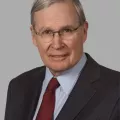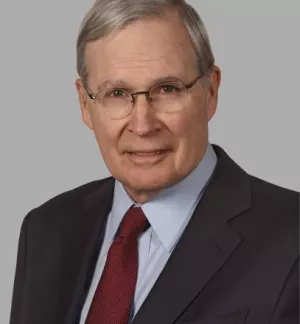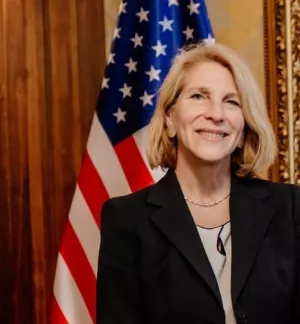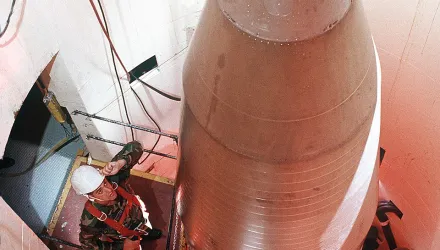Karen Donfried: I have the great pleasure of sitting here at the Belfer Center with Steve Hadley. Many of you think of him, first, as a former national security advisor to President George W. Bush. But we here at the Belfer Center think of him as a Belfer Senior Fellow. I'm Karen Donfried, and I also have the great pleasure of being a Senior Fellow here at the Belfer Center at Harvard's Kennedy School.
Steve Hadley and I wanted to sit down and have a conversation about the major challenges facing the United States today. We find ourselves at an inflection point, as many have noted, given all of the turmoil in our world, whether it's Russia's unjustified invasion of Ukraine or whether it is Hamas' horrific attack on Israel. And we also see this shift of the world's autocracies seeming to deepen their ties. China and Russia might be one example of that. But let me turn to Steve Hadley for his thoughts on the world as we find it today.
Steve Hadley: Karen, it's nice to be with you here at the Kennedy School and the Belfer Center. The need for institutions like this could never be greater than it is now.
You mentioned inflection points. If you look historically you might ask, "Where have the great inflection points been?" One was after World War I, when we tried to construct a world order based on a League of Nations and the Treaty of Versailles that ended World War I. It didn't work out very well; it was not sustainable. America retreated into isolationism and we got World War II. Another inflection point came at the end of World War II, when we took a different approach, a much more American engagement in trying to construct the international order. America was a principal architect of that order with friends and allies. And that order survived much better.
That international order got a bit of a shot in the arm after the end of the Cold War, which was a kind of third inflection point. With Hitler and fascism having been defeated in World War II and communism having been defeated in the Cold War, it seemed that a regime based on democracy, freedom, and free market principles was really the norm, the sort of consensus. That was the way you build a secure, prosperous, and modern economy.
That lasted until recent times, beginning with the second decade of this century when we saw a falling away from that consensus. We saw Russia and China offering the world much more of an authoritative state capitalism mode and method of organizing society. We've seen, basically, a breakdown of the order that was established after the end of World War II and a challenge to that order both from Russia and China. Russia, I think, favors chaos and China favors building an alternative.
So, where are we now? The United States, I think, now faces probably the greatest set of challenges we’ve faced in our history. If you think about it, we face a great power challenger with China, which is an economic and diplomatic and soon to be military powerhouse. We have Russia that is seeking to reestablish a Russian Empire, not a Soviet empire, but a Russian Empire in Europe at the expense of Ukraine, Belarus, and maybe the Baltic states and Poland as it tries to regain control over traditional Russian lands.
And now we have the uncertainty of the Middle East, and whether Hamas' brutal attack on Israel will provoke what could become a region-wide confrontation between Israel and neighbors in the Gaza Strip, Hezbollah in Lebanon, Hezbollah on Golan Heights, and disruption and discontent and violence on the West Bank. We're in some sense challenged in three strategic theaters, and I think in many ways the United States is not particularly well-positioned to deal with the challenges it faces.
There's a lot of work to do, and the Belfer Center needs to be working that agenda up here, because the country is going to need the help. The administration, whether Republican or Democrat, is going to need that help.
Karen Donfried: That was such an interesting assessment of recent history and these different phases that we have been experiencing. You said many things that caught my attention, but your comment about China perhaps at this moment preferring calm and Russia preferring chaos, really caught my attention. As we think about our interests here, it seems clear that we would prefer an order that is less chaotic. We would like not to see Hamas' horrific attacks on Israel leading to a broader conflict in the Middle East. We'd like to see a tamping down of these conflicts.
I'm interested in your sense of whether this could be a significant difference between China and Russia over time? Under Xi, we've seen a China that certainly is no longer pursuing a quiet rise but has pursued a very assertive, aggressive rise.
But given some of the economic challenges China's facing now, many China specialists argue that China would like more time before it faces its own challenges on the global stage. Do you think that there's any opportunity for China to be helpful to the U.S.as it looks out at this messy world? Or do you think China is perfectly pleased to see U.S. leadership challenged by this proliferation of global crises?
Steve Hadley: It's a very good question, Karen, and I don't have a perfect answer to it. I think in the short run, however, Putin and Xi are brought together because they both feel that their regimes and their control are threatened by the United States. We don't accept the legitimacy of their regimes. Democracy and freedom, in some sense, are antithetical to their regimes, which explains why they have worked together to frustrate American policy internationally and to challenge our values and principles of freedom, democracy, rule of law, and human rights. They try to constrain them in their own home countries, try to discredit them internationally, and quite frankly, try to discredit them by intervening in our own politics here. So, I think there is a real commonality between the two leaders in that agenda of thwarting the American-led international order in its current incarnation.
I do think, and Russia experts may call me up on this, but I do think Russia thinks that it benefits by discrediting the United States, undermining our institutions, and in some sense sowing chaos - that Russia will be able to vindicate its own national interests and its vision of the role it should play in the world in the midst of that chaos.
China being a power that is now integrated into the world economically has, I think, a different view. They would like an international system, but they would like one that is built more on principles that are consistent with their society and their conception of their society. And you see that with Xi Jinping’s Global Development Initiative, Global Civilization Initiative, and the Belted Road, which is a Global Infrastructure Construction Initiative.
China is out there trying to lead the world and establish a different kind of architecture that is more reflective of their values and more reflective, quite frankly, of the position they think they are entitled to play in the world. I think that's very different than for Putin. You don't get that sort of conceptualization coming out of Putin. You get much more sowing chaos and exploiting that chaos.
What could cause China to have some reservations about what Putin is doing? If Putin really has an agenda of trying to restore the Russian Empire in Europe at the expense of his neighbors and puts, in some sense, prosperity in Europe at risk, that's a problem for China, because Europe still is an important market for China. There is a point at which, I hope, Putin will have gone too far even for China. There’s a question of whether China at that point would use its influence on Putin to dial him back a bit. We’ll have to see.
Karen Donfried: Steve, we at Belfer are so lucky to have you here for exactly these kinds of conversations. It’s been wonderful that we've been able to share some of your insights with the broader Belfer community. Thanks so much.
Steve Hadley: Thank you. It was a pleasure to be here.







